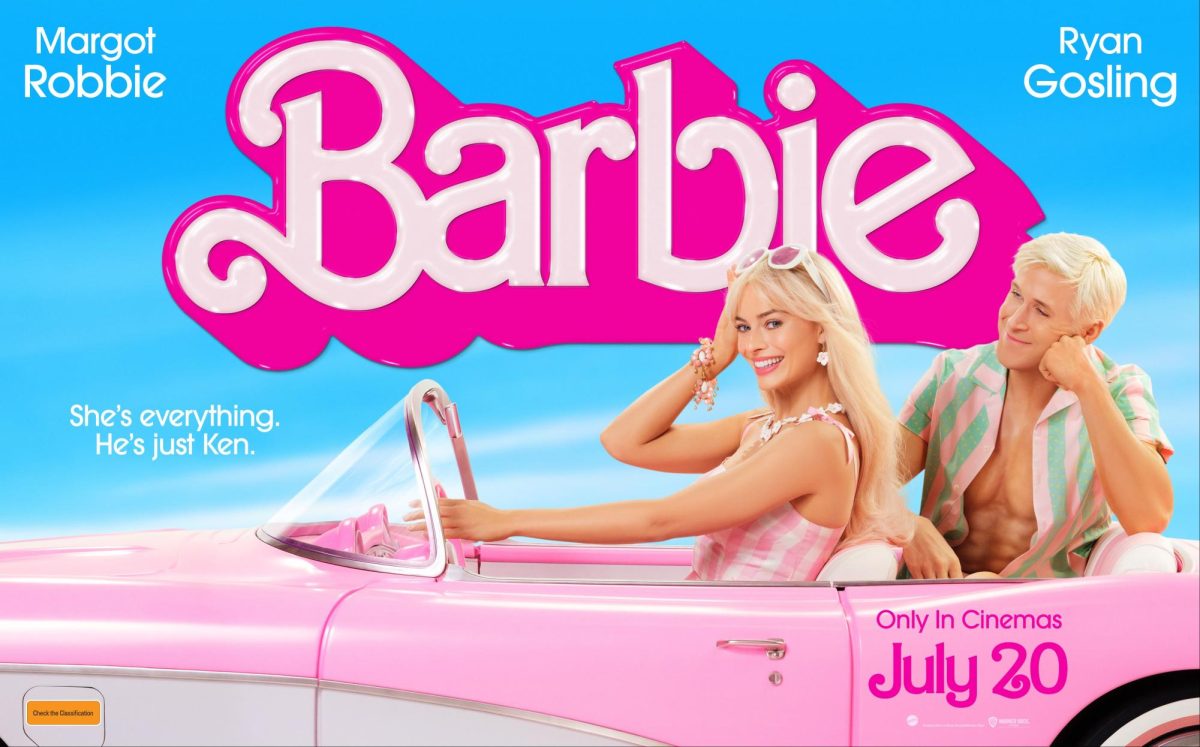With the help of multiple artists such as Nicki Minaj, Ice Spice, and Khalid, as well as a wave of pink marketing across various industries, “Barbie” was mainly targeted toward young girls, but unwittingly, it converted our own world into Barbieland.
Starring Margot Robbie and Ryan Gosling, the beginning of the movie takes place in a world governed by powerful women, with a Black female president, a roster of capable Supreme Court Justices, and a trans doctor. However, as the movie progresses, abnormal occurrences (for a high-heeled Barbie) such as “flat feet” cause Stereotypical Barbie to become increasingly preoccupied with questions about her place in the universe, leading to a significant change in her character when she abruptly expresses her fear of looming death.
She encounters Kate McKinnon’s “Weird Barbie”, a parody of the one Barbie doll we all broke when we were kids, who advises her to seek wisdom in the “real world”.
Barbie is given a rude awakening there: women do not rule the world. Women don’t even run the business that created her. She learns one truth, “Women hate women, men hate women. It’s the only thing we can agree on.”
“Barbie” does an amazing job of depicting the experiences of girls as they gradually integrate into society and realize they need to be strong enough to face adversity and discrimination.
She discovered that every day is a battle, with catcalling, disrespect, and outright assault–something all girls can attest to.
When I was in seventh grade at the mall with my friend, I was catcalled by a man and his children. He only called out to me, but that incident changed my perspective of the world. Suddenly, I felt alienated and alone, and I was curious as to what gave him the right and confidence to howl at me in public. This incident lives in my mind as a constant reminder that I’m not safe anywhere I go because of the fact that I am a woman.
Near the end, a slideshow depicting girlhood played and I couldn’t stop crying. When the movie was over, I stayed behind in my seat and watched as the people around me stood up and hugged each other, laughing over the music playing, crying about how lucky they were to be women.
This left an everlasting impact on the women who watched it. In the movie, the Barbies would cheerfully meet one another by exclaiming “Hey Barbie!”, a small act that reflected into our world. Girls would yell “Hi Barbie!” following the credits, and even at The Eras Tour, a woman waved at my friend who was wearing pink with this sincere greeting.
It felt as though, for a moment, the world was united by a hot pink bow. Issues that we dealt with as women didn’t seem as big anymore because we could hold hands, look each other in the eyes, and say, “I know how you feel.”
Additionally, the film did a fantastic job of illustrating how boys are impacted by societal norms for women, witnessing this injustice, and being instructed to accept it as it is.
One step into the real world, Ken fell into the throws of the patriarchy, eager to share it with the other Kens back home. All his life, he was forced to compete for Barbie’s attention with the other Kens and it caused him to feel some sort of vindictiveness toward her. By embracing the patriarchy, he felt special and needed.
This is true in our world; most times, boys are favored in their households or simply neglected, and when they become exposed to society, they’re corrupted by a system that gives them power. They’re taught to be domineering, that women are supposed to serve them.
However, Allan didn’t mind the Barbies’ dominance in Barbieland. In reality, when the Kens took control, he was attempting to flee.
Allan is portrayed as a direct polarity to Ken, not as buff as he, not as confident, not as aggressive. This serves as a metaphor for how guys who aren’t as “dominant” or who lack the stereotypically “masculine” traits, such as enmity, aren’t seen as masculine. This also illustrates the assumption that gay men owe us femininity and that men who aren’t as masculine are typically perceived as gay.
Although “Barbie” only succeeded in describing the most basic forms of misogyny, it was a fantastic tool to gradually introduce kids to the idea of inequity.
We are thrown into the unknown far too quickly, made to fend for ourselves, and forced to grow up too fast. Seeing the film gave me the chance to consider the aspect of myself that I was not given the chance to explore.
The film was a masterpiece all around.

